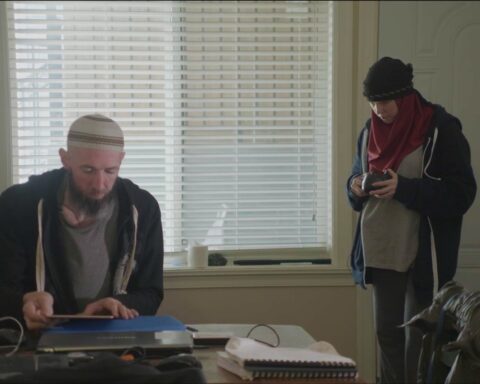Soros
(USA, 85 min.)
Dir. Jesse Dylan
Jesse Dylan’s insightful, timely documentary Soros starts with a flurry of images from around the world that present the film’s subject as the main manipulator of the world’s economy. This George Soros is a horned and diabolical Jewish puppet-master foisting his ideology upon a world like intellectual rape. It’s a startling, Ludovico -like introduction to a man who is mostly known for his vilification rather than his actual story, long the punching bag of right-wing media and an easy scapegoat for those hewing to a more conservative course. Through a series of interviews with fans and skeptics alike, Dylan paints a complex, sympathetic picture of the man, providing refreshing context to a fascinating, divisive and impactful individuals from the last century.
Born in Hungary in the 1930s, Soros’ adolescent years were spent under German occupation. His father had arranged for false papers that allowed them to live officially as Christians, a pragmatic and life-saving decision that inspired the theory that the Jewish Soros was a one-time Nazi himself. By 1944, one form of tyranny was replaced by another, and we hear from Soros’ mother testimony of her sexual assault by the incoming Soviet forces.
This duality of fascism and communism, fuelled by hatred and control with the subsuming of the individual to the whims of the state, provides the backbone to Soros’ philosophy. Combined with the writings of Karl Popper, whose reflections upon “open society” would provide the intellectual weight behind much of what Soros would help promote, the hedge fund titan would eventually take his billions earned by betting against prevailing economic orthodoxy and find individuals in their own nations who could help make the world more inclusive, more fair, more attuned to the needs of the individual.
From his earliest days helping to fund scholars in South Africa through to his latest efforts on COVID-19 support, Soros’ unique brand of political philanthropy has engendered nearly as much backlash as it has broad success. His attempts to resuscitate Eastern Europe and Russia after the downfall of the Soviet Union has seen a massive counter-reaction, with the leader in his home country of Hungary, a recipient himself of Soros-funded education, decrying the man as a globalist devil.
Dylan wisely allows this negativity to be given voice in the film. The doc contrasts images of Tucker Carlson and clips of Glenn Beck with the likes of former U.N. Secretary General Kofi Annan speaking of Soros’ role in helping to bring piece and comfort to those suffering during the Balkan War in the 1990s. The result evokes a sense of whiplash, where genuine questions about the role of billionaires in shaping world history are couched by hypocrisy. (The names “Koch,” “Adelson,” and “Murdoch” are not uttered by the naysayers even in defense.) The machinations that subvert political will via incompetence or nefariousness fester while looking for a single, simple scapegoat in order to distract.
Soros’ children provide further sympathetic views of his legacy; however, even there, we see some of the challenges of living under the shadow of this mercurial man. Soros is clearly shown in a positive light, but this film is no hagiography. The challenging themes and real-world problems that his decades of philanthropy are made to confront appear in all their complexities.
For example, there’s likely no more challenging confrontation to the ideals of his work than what has transpired in Myanmar. Soros’ shift from supporting the Nobel Peace Prize-winning Aung San Suu Kyi to the local Rohingya who have been violated under her rule is presented effectively as an indication of his purity of intent without being locked into dogmatism or intransigence. This approach admittedly portrays a polarizing subject positively, but it equally belies the notion that all decisions are made under some grand, controlling power – even the supposed puppet-master gets manipulated.
The film spends little time deeply diving into the more nefarious forces that prop up Soros as a Semitic bogeyman. The brief flashes of hate that we see at the end (with Canada far from immune) indicating these waves of intolerance that continue to bubble during these tumultuous times.
Soros serves as an effective beginning to the conversation about a remarkable and controversial figure. It provides a dispassionate yet engaging look at the man’s effect on the world’s stage. Rather than taking his money and quietly reveling in his wealth, Soros has taken it upon himself to be engaged in order to try, in his own way, to make the peoples of the world free from tyranny and hatred. The results have been mixed at best, and the counter-reaction focused as much upon this single character rather than the validity of the ideas and actions being promoted.
At the time of this writing, with an intransigent President refusing to leave office and a legal team for the same leader spewing lies about vote manipulation and liberal conspiracy supposedly all under the control of the titular character in this documentary, Soros remains as divisive and important a figure as any in the modern world. He lives at the crossroads of so many facets – philosophical, political, and economic – that it’s easy to use him as more than a man but a symbol for the various forces that continue to shape all aspects of global discourse. Dylan’s documentary does well to open the door to these conversations, and while not a definitive dive into all these subjects, it does well to provide a journalistically acute, intellectually beneficial look into this most remarkable, contradictory, fascinating individual.













